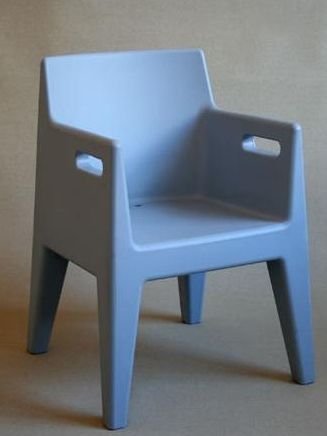

Prix FOB
Obtenir le dernier prix|
500 Unit Minimum Order
Pays:
China
N ° de modèle:
-
Prix FOB:
Localité:
-
Prix de commande minimale:
-
Commande minimale:
500 Unit
Packaging Detail:
-
Heure de livraison:
-
Capacité de Fournir:
-
Payment Type:
-
Groupe de produits :
-
Personne à contacter Mr. Li
10 Jinhui Road, Huishan District, Wuxi, Jiangsu
These days,
everybody who's anybody in international design is doing something
ground breaking in plastic seating, tables or even
cabinetry.
But the
plastic they're working with "has evolved drastically" from the
***0s, according to Ivan Luini, president of Kartell US Inc. "There
are plastics now that were not available back then," Luini
continues. Such as: a kind of polypropylene (normally hard and
dense like wood) that feels cushy like foam, but isn't. Last
spring in Milan, Kartell introduced a spongy plastic chair made
from the techno-polymer.
And there are
new production techniques too.
"What I am
impressed with in what a company like Magis does or what Kartell
does, is that they are using plastic as a noble material"*-not as a
cheap substitute for something else, says Alan Heller, the uncommon
American doing designer plastics.
The molten
material allows for shapes and designs that simply could not be
done in any other material, says Heller, whose New York-based
company works with Italian maestro Mario Bellini and other top
European designers to create Modern plastic furniture.
Manufacturing is done in Iowa and Italy.
Rotational
moulding is one of the most recent triumphs of the Italian
furniture world. It allows for the mass production of large plastic
furniture that is hollow and therefore less costly and cumbersome.
In a technique similar to the one used to make hollow chocolate
Easter eggs, plastic powder is dispersed by centrifugal force
through a hot mould that rotates randomly on several axes. After a
matter of minutes, the powder evenly coats the walls of the
mould*-and a chair or sofa is sprung free, holding secret its empty
inside.
These days,
everybody who's anybody in international design is doing something
ground breaking in plastic seating, tables or even
cabinetry.
But the
plastic they're working with "has evolved drastically" from the
***0s, according to Ivan Luini, president of Kartell US Inc. "There
are plastics now that were not available back then," Luini
continues. Such as: a kind of polypropylene (normally hard and
dense like wood) that feels cushy like foam, but isn't. Last
spring in Milan, Kartell introduced a spongy plastic chair made
from the techno-polymer.
And there are
new production techniques too.
"What I am
impressed with in what a company like Magis does or what Kartell
does, is that they are using plastic as a noble material"*-not as a
cheap substitute for something else, says Alan Heller, the uncommon
American doing designer plastics.
The molten
material allows for shapes and designs that simply could not be
done in any other material, says Heller, whose New York-based
company works with Italian maestro Mario Bellini and other top
European designers to create Modern plastic furniture.
Manufacturing is done in Iowa and Italy.
Rotational
moulding is one of the most recent triumphs of the Italian
furniture world. It allows for the mass production of large plastic
furniture that is hollow and therefore less costly and cumbersome.
In a technique similar to the one used to make hollow chocolate
Easter eggs, plastic powder is dispersed by gravity force through a
hot mould that rotates randomly on several axes. After a matter of
minutes, the powder evenly coats the walls of the mould*-and a
chair or sofa is sprung free, holding secret its empty
inside.
| Pays: | China |
| N ° de modèle: | - |
| Prix FOB: | Obtenir le dernier prix |
| Localité: | - |
| Prix de commande minimale: | - |
| Commande minimale: | 500 Unit |
| Packaging Detail: | - |
| Heure de livraison: | - |
| Capacité de Fournir: | - |
| Payment Type: | - |
| Groupe de produits : | - |